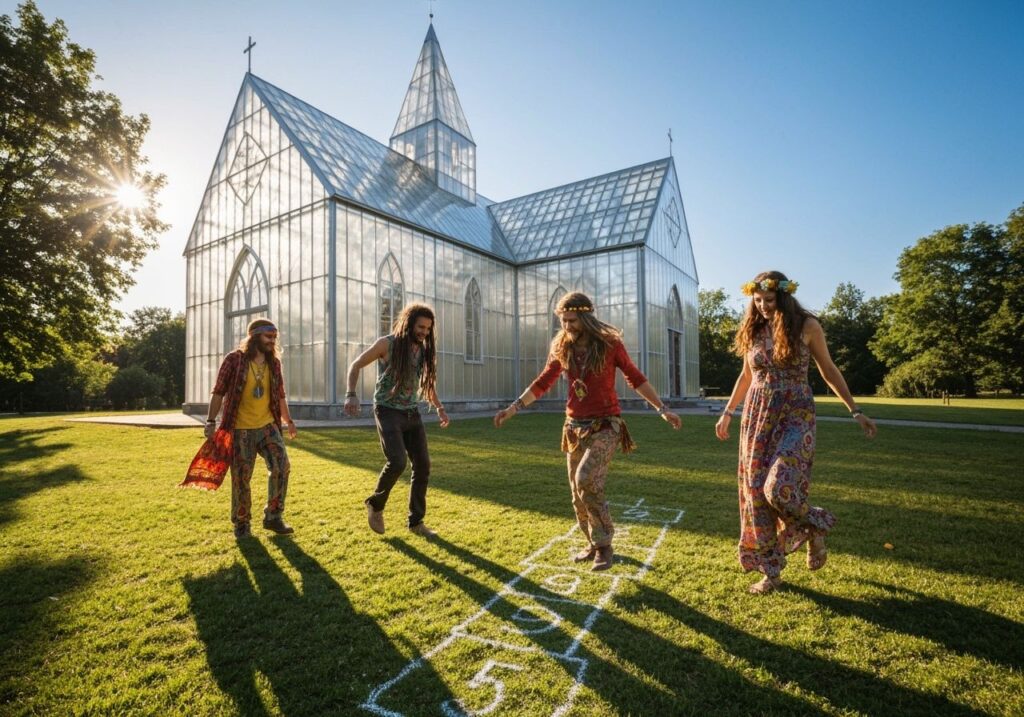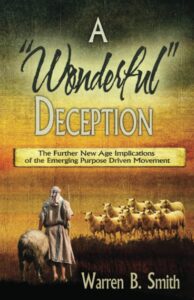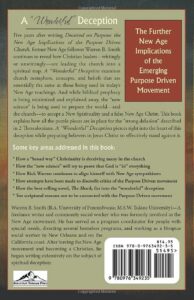Let me tell you about my spiritual journey—a decades-long game of religious hopscotch that taught me the most humbling lesson of my life: no matter how far you think you’ve traveled from organized religion, you might just end up in the biggest church of all.
I was born Catholic, baptized as a baby in a ceremony I obviously don’t remember, raised on Sunday masses and catechism classes. The rituals, the hierarchy, the guilt, the rules—it all felt suffocating as I grew older. By my teens, I was questioning everything: Why did we need a priest to talk to God? Why were there so many rules about what to eat, when to kneel, how to pray? I wanted something real, something authentic, something that wasn’t just following orders from men in robes.
So I left. And thus began my journey through what I now call “religious hopscotch”—jumping from one spiritual square to another, convinced each time that I’d finally found the truth, the real path, the authentic way to connect with the divine.

Square One: Jehovah's Witnesses
My first hop landed me with the Jehovah’s Witnesses. Here, finally, was a group that seemed to have it figured out. They studied the Bible intensively, questioned mainstream Christianity, and seemed to have answers for everything. The door-to-door witnessing felt authentic—these people were so convinced of their truth that they’d face rejection and ridicule to share it.
For a while, I threw myself into Kingdom Hall meetings, Bible studies, and field service. I learned their doctrine inside and out, memorized scriptures, and genuinely believed I’d found the one true religion. Everyone else was deceived, but we had the real truth.
Looking back now, I can see how this fed my ego. I wasn’t just religious—I was part of the select few who really understood God’s plan. We had exclusive knowledge, special insight, the correct interpretation of scripture. It felt so much more authentic than the mindless ritual of Catholicism.
But eventually, the cracks started showing. The same authoritarian structure I’d fled in Catholicism was here too, just dressed differently. Instead of priests, we had elders. Instead of papal authority, we had the Watchtower organization. The rules were different, but the control was the same. And the exclusivity that had initially attracted me started feeling like spiritual elitism.
Square Two: Rastafari
My next hop took me in a completely different direction. Rastafari felt revolutionary, authentic, connected to something ancient and real. Here was spirituality tied to justice, to natural living, to rejecting the “Babylon system” of oppression and materialism. No formal churches, no rigid hierarchy, just pure spiritual connection through meditation, natural herbs, and conscious living.
I grew my hair into dreadlocks, studied Ethiopian history, learned about Haile Selassie, and embraced the lifestyle completely. This wasn’t religion—this was spiritual consciousness, a way of life that connected me to both divinity and the struggles of oppressed people worldwide. I felt like I was finally living authentically, rejecting the artificial structures of organized religion for something real and meaningful.
The community was beautiful. The music was transcendent. The focus on natural living and social justice resonated deeply with my values. For years, I was convinced I’d found my true spiritual home—something that wasn’t really a religion at all, but a conscious way of being.
Yet slowly, I began to notice the same patterns emerging. There were accepted beliefs you couldn’t question without being labeled unconscious. There were spiritual authorities whose words carried special weight. There were rituals and practices that became mandatory for authentic participation. There was an in-group mentality that subtly dismissed outsiders as spiritually inferior.
Once again, I’d found community, meaning, and transcendence. But I’d also found the same human tendencies toward orthodoxy, authority, and exclusion that I thought I was escaping.
Square Three: Atheism
Frustrated with the repeated patterns I kept encountering, I made what felt like the most radical hop of all—into atheism. No more supernatural beliefs, no more spiritual communities, no more searching for higher truths. Just reason, science, and rational thinking. If religion kept leading to the same human problems, then the solution was obvious: abandon religion entirely.
This felt like the ultimate liberation. I read Dawkins, Hitchens, and Harris. I dove deep into evolutionary biology, cosmology, and neuroscience. I felt intellectually superior to people who still needed the comfort of imaginary beings and magical thinking. Finally, I was free from the manipulation and group-think that plagued all religious communities.
For several years, atheism felt like coming home to intellectual honesty. I was proud of my rationality, my commitment to evidence-based thinking, my freedom from the delusions that trapped so many others. I joined atheist forums, attended skeptic meetups, and felt part of a community of enlightened individuals who had seen through humanity’s oldest and most persistent lie.
But then something uncomfortable started happening. I began noticing that atheist communities had their own orthodoxies, their own authorities, their own ways of excluding and dismissing people who didn’t think correctly. There were accepted beliefs you couldn’t question, revered authors whose words carried special weight, and a distinct us-versus-them mentality toward religious people.
We had our own missionary work—evangelizing for reason and science. We had our own forms of moral superiority—looking down on people who still needed religion as crutches. We even had our own rituals—regular meetings, shared reading materials, collective affirmation of our rational worldview.
The ego that had driven my spiritual seeking was still there, just dressed in different clothes. Instead of being spiritually superior, I was intellectually superior. Instead of having exclusive religious truth, I had exclusive rational truth. The structure was the same; only the content had changed.
Square Four: New Age Spirituality
My final hop landed me in what felt like the most sophisticated spiritual territory of all—New Age spirituality. Here was something that seemed to combine the best of everything I’d learned: the mystical depth of religion without the institutional baggage, the intellectual sophistication of science blended with spiritual wisdom, the community of shared seekers without rigid authority structures.
I dove headfirst into meditation apps, manifestation techniques, energy healing, crystal therapy, and consciousness expansion. I attended workshops on quantum physics and spirituality, learned about chakras and auras, and embraced the idea that we create our own reality through our thoughts and vibrations.
This felt like the ultimate evolution—spiritual but not religious, scientific but not materialist, individual but still connected to a global community of awakened souls. I subscribed to meditation platforms, followed spiritual teachers on social media, attended virtual ceremonies, and organized my life around raising my vibration and manifesting my highest good.
For the first time, I felt like I’d found something that honored both my need for spiritual connection and my desire for intellectual freedom. No one was telling me what to believe—I was discovering universal truths through my own experience and study. I wasn’t following a religion; I was awakening to cosmic consciousness.
I spent years building my spiritual practice, investing thousands in courses and retreats, surrounding myself with like-minded souls who were all on their own journeys of awakening. We shared a common language about energy, manifestation, and consciousness levels. We supported each other’s growth and celebrated each other’s breakthroughs.
The Moment of Recognition
Then one morning, during my regular 6 AM meditation—synchronized with thousands of others around the world—it hit me like a lightning bolt of cosmic irony: I was in church.
Not just any church, but possibly the biggest, most organized, most influential church in human history. And just like every other time in my spiritual journey, I had convinced myself I was doing something completely different.
I looked around my meditation space—crystals arranged according to ancient wisdom teachings, spiritual books stacked like scripture, subscription confirmations from multiple enlightenment platforms in my email, a carefully curated social media feed full of spiritual teachers whose words I treated as gospel. My calendar was organized around moon phases, meditation schedules, and spiritual practices. My budget included regular tithing to consciousness coaches and manifestation courses.
I was practicing daily rituals, following spiritual authorities, participating in synchronized ceremonies, adhering to dietary guidelines, organizing my worldview around specific metaphysical beliefs, and regularly investing money in my spiritual development. I was part of a global community of believers who shared the same vocabulary, practices, and fundamental assumptions about reality.
The only difference between this and my Catholic childhood was that no one was calling it religion.
The Ultimate Irony Revealed
In that moment of recognition, the entire journey became crystal clear. I hadn’t been escaping religion at all—I’d been shopping for the perfect religion while convincing myself I was above such primitive thinking. Each hop in my spiritual hopscotch game had been motivated by the same ego-driven need to be right, to be special, to be part of the enlightened few who really understood truth.
From Catholic to Jehovah’s Witness to Rastafari to atheist to New Age—each transition had been driven by the same pattern: dissatisfaction with the limitations and contradictions of my current belief system, attraction to something that seemed more authentic or truthful, initial enthusiasm for the new perspective, gradual recognition of familiar human patterns, and eventual disillusionment leading to the next hop.
But the most stunning realization was this: the New Age movement wasn’t just another religion—it was the ultimate religion. It had solved every problem I’d encountered in previous spiritual communities by making them invisible.
Don’t like hierarchy? We’ll create spiritual authorities but call them teachers and coaches. Don’t like tithing? We’ll call it energy exchange and investment in your growth. Don’t like rigid doctrine? We’ll call it universal laws and cosmic principles. Don’t like mandatory attendance? We’ll make every moment a spiritual practice. Don’t like exclusive truth claims? We’ll say everyone’s truth is valid while subtly ranking consciousness levels.
The New Age had given me permission to be completely religious while maintaining my identity as someone who had transcended religion. It was the perfect church for people who don’t want to go to church.
The Ego Behind the Journey
Looking back at my entire spiritual journey, I can now see the common thread that connected every phase: ego. Not the spiritual ego that New Age teachers warn about, but the fundamental human ego that needs to feel special, right, and superior to others.
As a Catholic, my ego was fed by being part of the one true church. As a Jehovah’s Witness, my ego was fed by having exclusive biblical truth. As a Rastafari, my ego was fed by being spiritually conscious in an unconscious world. As an atheist, my ego was fed by being rationally enlightened among the deluded masses. As a New Age practitioner, my ego was fed by being spiritually awakened at a higher consciousness level.
Each tradition offered the same fundamental promise: you are special, you have found something others have missed, you are part of an enlightened minority that understands what the masses do not. The content changed, but the ego satisfaction remained constant.
This ego-driven separation is what makes religious manipulation possible. As long as we need to feel spiritually superior to others, we remain vulnerable to any system that promises to elevate us above the common crowd. We’ll trade one set of beliefs for another, one community for another, one authority structure for another, all while convincing ourselves we’re becoming more free and authentic.
The Recognition of Unity
The final lesson of my journey isn’t that all religions are false or that spiritual seeking is pointless. It’s that the thing I was seeking—connection to something greater than myself, community with like-minded souls, meaning and purpose in life, practices that cultivate inner peace and wisdom—these are fundamental human needs that every spiritual tradition attempts to address.
The problem was never with the various traditions I explored; it was with my approach to them. I was using spirituality as a tool for ego enhancement rather than ego transcendence. I was seeking separation rather than connection, superiority rather than humility, exclusive truth rather than inclusive wisdom.
Every hop in my religious hopscotch game had been an attempt to find the perfect spiritual system that would confirm my specialness and superiority. But what I actually needed was to recognize the underlying unity behind all genuine spiritual practice—the universal human search for meaning, connection, and transcendence that expresses itself in countless forms across cultures and centuries.
The End of Hopscotch
Today, I no longer play religious hopscotch. I’ve stopped looking for the perfect spiritual system because I’ve realized that the seeking itself was the problem. The moment you think you’ve found the ultimate truth that others have missed, you’ve fallen back into the same ego trap, regardless of whether you’re in a cathedral, a kingdom hall, a ganja session, a skeptic meeting, or a manifestation workshop.
Instead, I’ve learned to appreciate the wisdom available in many traditions while remaining skeptical of any system that promises exclusive access to truth. I practice meditation without needing it to be the best form of spiritual practice. I find meaning in community without needing my community to be superior to others. I explore spiritual concepts without needing to believe I’m more awakened than people who think differently.
Most importantly, I’ve learned to recognize the signs of ego-driven spiritual seeking in myself and others. When I find myself feeling superior to people with different beliefs, when I start thinking my spiritual practices are more advanced than others’, when I begin to see the world in terms of conscious versus unconscious people—that’s when I know my ego has hijacked my spiritual journey again.
My Message to Fellow Seekers
If you’re reading this and recognizing your own journey in my story, know that you’re not alone. The path of spiritual seeking is filled with these kinds of realizations, and they’re not failures—they’re essential parts of the journey toward genuine wisdom and compassion.
The invisible church I found myself in isn’t inherently bad or wrong. Many of the practices, communities, and teachings within New Age spirituality have genuine value and have helped millions of people find peace, healing, and purpose. The problem isn’t with the church itself, but with the unconscious way we can use any spiritual tradition to feed our ego’s need for specialness and separation.
Whether you’re currently Catholic, Protestant, Jewish, Muslim, Hindu, Buddhist, atheist, agnostic, New Age, or something else entirely, the invitation is the same: examine your motivations. Are you seeking truth, or are you seeking to be right? Are you looking for connection, or are you looking for superiority? Are you cultivating wisdom and compassion, or are you building spiritual identity and status?
The moment we stop needing our spiritual path to make us special, we become free to learn from the wisdom available everywhere—in ancient traditions and modern movements, in religious communities and secular philosophies, in other people’s journeys and our own continued seeking.
The Invisible Church Everywhere
The greatest irony of my journey is that I spent years trying to escape the invisible church, only to discover that it’s everywhere—not just in New Age communities, but in every human gathering that promises meaning, purpose, and belonging. Political movements, professional communities, lifestyle brands, social causes, intellectual circles, artistic scenes—they all can function as invisible churches when we use them to establish our identity and superiority over others.
The invisible church isn’t a place or a system; it’s a pattern of human behavior that emerges whenever we gather around shared beliefs and practices while convincing ourselves we’re different from or better than other groups doing the same thing.
Recognition of this pattern is the beginning of real spiritual maturity—the ability to participate in communities and traditions without losing ourselves in them, to learn from teachers without surrendering our discernment, to practice spiritual disciplines without using them to build spiritual ego.
My decades of religious hopscotch taught me that there’s no perfect spiritual system waiting to be discovered, no ultimate truth that will finally satisfy the seeking mind, no community so enlightened that it transcends human nature. But there is something even better: the recognition that the search itself, with all its twists and turns and humbling realizations, is the real spiritual path.
And sometimes, the greatest spiritual teaching comes not from finding the right church, but from recognizing that you never left the one you thought you’d escaped—you just learned to make it invisible.
Hey there! We hope you love our fitness programs and the products we recommend. Just so you know, Symku Blog is reader-supported. When you buy through links on our site, we may earn an affiliate commission at no extra cost to you. It helps us keep the lights on. Thanks.
Disclaimer: The information provided in this discussion is for general informational and educational purposes only. It is not intended as medical or professional advice. Only a qualified health professional can determine what practices are suitable for your individual needs and abilities.


